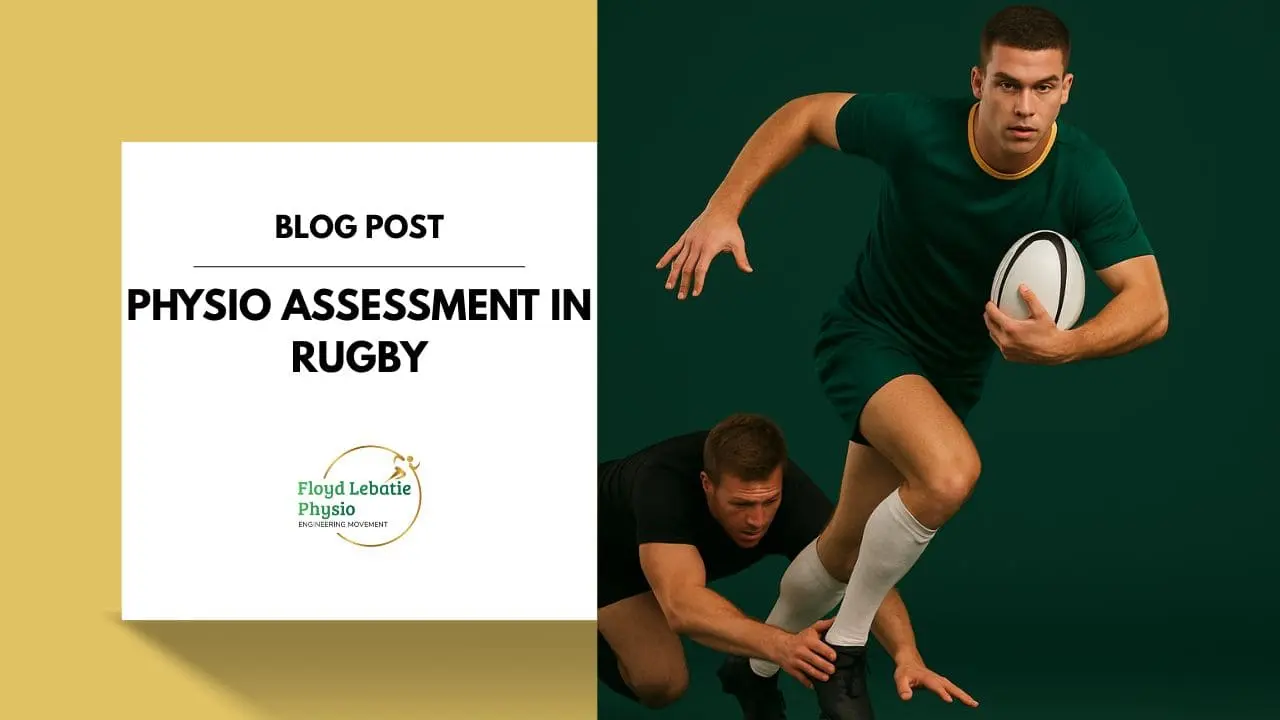Why Physio Assessments in Rugby matters: Your Questions Answered
At Floyd Lebatie Physiotherapy, we know rugby is one of the most physically demanding sports in the world. Because of its intensity, collisions, and constant changes in direction, rugby places huge stress on the body. This is why musculoskeletal assessment – checking how your joints, muscles, and movement patterns are working – is so important for both performance and injury prevention.
Here are some common questions we hear from players, parents, and coaches.
What is a musculoskeletal assessment?
A musculoskeletal assessment is a structured evaluation of the body’s key systems for movement. It looks at mobility, flexibility, balance, strength, power, agility, and movement mechanics. In rugby, this helps identify not only injuries but also potential weaknesses or imbalances that might increase injury risk or hold back performance.¹
Why is it so important for rugby players?
- Rugby players are exposed to high levels of contact, sprinting, tackling, scrummaging, and rapid changes of direction. Studies show that these demands require excellent physical preparation, including strength, endurance, and sport-specific skills.² If even one part of the body is restricted – such as poor hip mobility or reduced shoulder stability – it can affect performance and increase injury risk. Regular assessment ensures these issues are identified and corrected before they cause problems.³
How does this help with injury prevention?
Early identification of movement limitations or muscular imbalances allows physiotherapists to address problems before they lead to injury. For example, a player with poor landing mechanics may be more likely to suffer knee injuries, while weak neck strength may raise the risk of concussion in contact situations. Targeted corrective exercises and monitoring help reduce these risks and keep players available for selection.² ⁵
Does this also improve performance?
Yes. Musculoskeletal assessments don’t just find risks; they also highlight opportunities for growth. By measuring mobility, balance, strength, agility, and power, players can see their progress over time and set training goals with greater accuracy. Evidence shows that structured assessment and testing can inform conditioning programs that improve both individual performance and overall team standards.² ³
How we assess:
At Floyd Lebatie Physiotherapy, we use modern, evidence-based tools to make your assessment as tailored and accurate as possible:
- Digital goniometry: To measure joint movement and muscle flexibility.
- Handheld dynamometry: To objectively test muscle strength.
- Motion capture AI: To provide precise, metric analysis of balance and movement control.
- Force plates: To measure jump height, landing mechanics, and power output.
These technologies give us measurable data that we can track over time, helping players see progress clearly and guiding training programs with confidence.
Key Takeaways:
- Musculoskeletal assessment is essential for rugby because of the sport’s unique physical demands.
- It identifies risks and prevents injuries by spotting imbalances or poor movement patterns early.
- Evidence-based tests ensure accurate monitoring of qualities like mobility, balance, strength, agility, and power.
- Assessments not only prevent injury but also help rugby players perform at their best.
- Modern tools such as digital goniometers, dynamometers, motion capture AI, and force plates make assessments precise and reliable.
At Floyd Lebatie Physiotherapy, we use structured musculoskeletal assessments to support rugby players of all levels. Our goal is to keep you safer, stronger, and performing at your peak.
References:
- Gray J, Naylor R. Musculoskeletal Assessment Protocol for Rugby Players (unpublished clinical protocol).
- Duthie G, Pyne D, Hooper S. Applied physiology and game analysis of rugby union. Sports Med. 2003;33(13):973–91.
- Chiwaridzo M, Ferguson GD, Smits-Engelsman BCM. A systematic review protocol investigating tests for physical or physiological qualities and game-specific skills in rugby. Syst Rev. 2016;5:122.
- Ardern CL, et al. 2016 Consensus statement on return to sport. Br J Sports Med. 2016;50:853–864.
- Chiwaridzo M, Mudawarima T, Shumba T, Ferguson GD, Smits-Engelsman BC. Comparative analysis of physical fitness characteristics and rugby-specific skills in schoolboys. S Afr J Sports Med. 2024;36(1).


